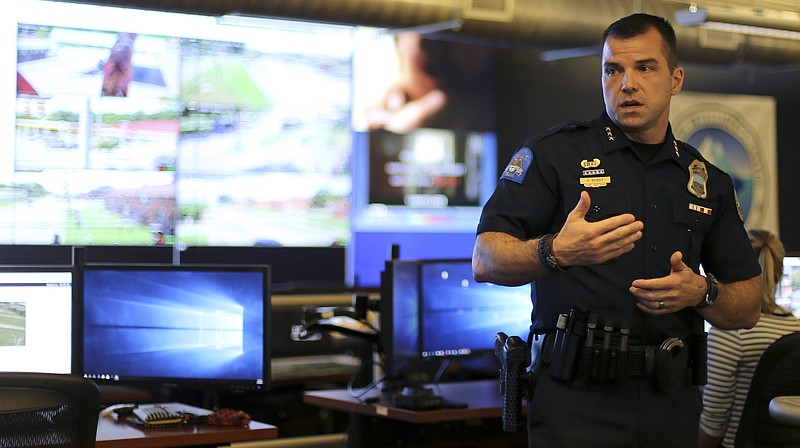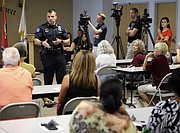The new Chattanooga police chief, David Roddy, spent part of his first official day on the job answering questions and bantering with a couple of dozen community members who came to the police service center to learn more about what officers do.
On Wednesday afternoon, he wandered up and down between rows of tables at which community organizers, business owners and other residents sat while he talked.
"I truly thank every single one of you," Roddy said. "I encourage this same level of participation more, bring your friends, kick-start some stuff, whatever it takes."
"It's all of us figuring out what we need to do in our city to address what we believe to be the most important thing in our city right now, and for us that's the safety of you all and the safety of everyone else out there."
Roddy was officially confirmed as Chattanooga's police chief in an 8-1 vote by the city council on Tuesday night, and Wednesday's public event was an opportunity for community members to better acquaint themselves with him. It also was an opportunity to learn about the real-time intelligence center - the department's newest resource and the focus of Wednesday's conversation.
A room full of screens and analysts, the center uses video footage from cameras at fixed locations throughout the city and data collected from reports and daily policing to direct the department's resources in a coordinated fashion. Since implemented, it already has played an instrumental role in securing the arrests of four gang members allegedly involved in the shooting of an 8-year-old boy.
"This started several years ago when Mayor [Andy] Berke started trying to figure out, 'How do we leverage technology with our police department to most effectively address crime with the finite amount of resources we have ... ? " Roddy told the small crowd of community members.
"On any given day, there is a set number of police officers that you have out patrolling your communities, [and] a certain number of investigators that follow up with specific types of crimes. Those resources, even when they are all brought to bear on something, are still finite."
Many of the questions asked by the crowd during an open portion of the event centered around the cameras and their applications, including one from a woman who asked what Roddy meant by using the acronym "RTIC."
"It's the real-time intelligence center. This is law enforcement, and we've got acronyms for everything. I've probably got four acronyms on me right now," he said while looking down at his uniform.
Akosa Cook also touched on surveillance, and she asked whether communities could push to see cameras go up in local greenspaces if they felt they would contribute to public safety in those areas.
"Is there a way for them to, if in their local park they'd like to have a public safety camera, to request it?" she asked.
Roddy told Cook the department intended to expand the program with help from the public. After the event, Cook said she appreciated Roddy and the department taking the time to welcome members of the public.
"I think it was great," she said. "I think a lot of residents are a little skeptical and a little cautious when it comes to police. If they opened up a little bit, they would realize we have a great police department."
Contact staff writer Emmett Gienapp at egienapp@timesfreepress.com or 423-757-6731. Follow him on Twitter @emmettgienapp.

